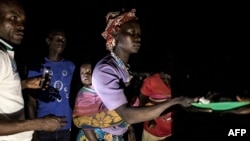The U.N. Refugee Agency, UNHCR, and 102 humanitarian and developmental agencies are asking for $1.2 billion to help 2.3 million South Sudanese refugees and communities sheltering them in five countries.
Nearly 4 million South Sudanese have fled nearly a decade of civil war and a peace deal that has not yet come to fruition, and they are either still in that country or have become refugees in neighboring countries.
The South Sudan refugee crisis is Africa's largest and the response to it is one of the least-funded humanitarian operations. An estimated 2.3 million people have fled to the Democratic Republic of the Congo, Ethiopia, Kenya, Sudan, and Uganda.
While praising their generosity, U.N. refugee spokesman Matthew Saltmarsh says those countries are poor, suffer from many of the same problems as does South Sudan and can ill-afford to care for the masses of impoverished refugees.
“South Sudan continues to grapple with sporadic violence, chronic food insecurity and the devastating impact of major flooding. The COVID-19 pandemic has also strained people’s resources. … Asylum countries are facing similar challenges from the climate crisis and the pandemic but have continued to keep their doors open for refugees,” he said.
Saltmarsh says the host countries need support to provide food, shelter, and essential services, such as education and health care.
The United Nations says women and girls in South Sudan are subject to gender-based violence, rape and conflict-related sexual violence. Saltmarsh says the UNHCR and partners will scale up programs to prevent and respond to gender-based violence. They will provide mental health and psycho-social support to victims of abuse.
“This follows a worrying rise in reports of depression over the last year, especially among refugees in Kenya and Uganda. It remains, of course, as you know a children’s crisis, with 2 out of 3 South Sudanese refugees being under the age of 18. Funding is required for child protection including to ensure proper birth registration and family reunification,” he said.
Saltmarsh acknowledges competition for scarce resources is fierce. He notes the international focus and response to the war in Ukraine is overwhelming. He says that is appropriate given the enormity of the crisis. However, he says the plight of the South Sudanese refugees must not be forgotten.





